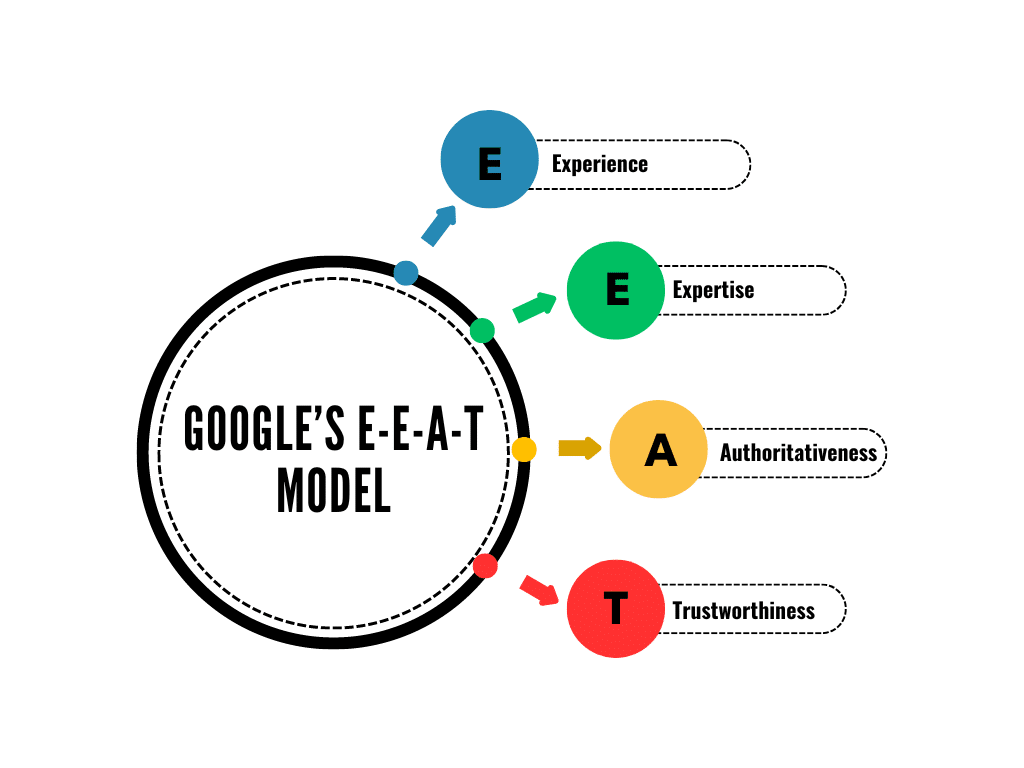Imagine that you’re searching for medical advice online. Two articles pop up, one from a random blog, the other from a renowned doctor’s website. Which one would you trust? If you’re like most people, you’d go for the doctor’s advice. This instinctive choice is exactly what Google’s E-E-A-T principle aims to replicate in search results.
E-E-A-T is not a passing trend in digital marketing; it represents a fundamental shift in how search engines evaluate content quality. Whether you’re a seasoned marketer or a business owner dipping your toes into the digital world, understanding E-E-A-T is necessary for your online success.
At its core, E-E-A-T stands for Experience, Expertise, Authoritativeness, and Trustworthiness. It’s the yardstick Google uses to measure content quality and determine what deserves to rank high in search results. By focusing on these four pillars, search engines aim to deliver the most reliable and valuable information to users.
The Evolution of E-E-A-T
Originally introduced as E-A-T in 2014, Google added the extra “E” for Experience in December 2022. This addition wasn’t just a minor tweak, it was a game-changer that emphasized the value of first-hand knowledge in content creation.
Why The Change?
The inclusion of “Experience” addresses a crucial gap in the original E-A-T framework. While expertise and authority are important, they don’t always translate to practical, real-world knowledge. By adding “Experience,” Google acknowledges that sometimes, lived experience can be just as valuable as academic expertise.
For example, a medical researcher might have extensive knowledge about a rare disease, but a patient living with that condition can offer invaluable insights about day-to-day management and coping strategies. Both perspectives are valuable, and together they provide a more comprehensive understanding of the topic.
The Four Pillars of E-E-A-T
To grasp the impact of E-E-A-T on your digital strategy, it’s important to understand each component in depth. Let’s break down these four pillars and explore why they matter:
1. Experience
Experience refers to first-hand or life experience with the topic at hand, embodying the idea of “been there, done that.” Users often seek relatable and practical advice from those who have lived through similar situations. For example, a travel blog post about backpacking through Southeast Asia written by someone who has actually done it will resonate far more with readers than generic articles compiled from online research. This personal touch adds authenticity and relevance to the content.
2. Expertise
Expertise encompasses specialized knowledge or skills within a particular field. It represents the “know-how” factor that tells readers they are receiving accurate and reliable information. When content is crafted by someone with extensive experience or education in a specific area—such as an SEO guide written by a digital marketing professional—it enhances credibility and trustworthiness. Readers are more likely to engage with content that demonstrates clear authority on the subject matter.
3. Authoritativeness
Authoritativeness relates to reputation and recognition within an industry, establishing yourself as a go-to source for information. When readers perceive an author or website as an authority, they are more likely to trust its content.
This perception is often built through consistent quality content, contributions to reputable publications, and engagement within relevant communities. The more recognized you are in your field, the more likely your audience will view you as an authoritative source.
4. Trustworthiness
Trustworthiness refers to the reliability and credibility of your content and website. It’s about building confidence in your audience that the information you provide is accurate, unbiased, and up-to-date.
For instance, a news website that clearly distinguishes between factual reporting and opinion pieces demonstrates a commitment to trustworthiness. By using transparent editorial policies, citing credible sources, and maintaining a secure website, you can establish a reputation of trustworthiness with users and search engines.
Implementing E-E-A-T in Your Digital Strategy
Now that we’ve explored what E-E-A-T is and why it matters, let’s look at some practical strategies to improve your content:
- Highlight Author Credentials: Create detailed author bios that showcase relevant qualifications, experience, and expertise.
- Leverage Expert Contributors: Collaborate with subject matter experts to enhance your content’s credibility.
- Showcase Real-World Experience: Incorporate case studies, personal anecdotes, and practical examples to demonstrate first-hand knowledge.
- Prioritize Content Quality: Focus on creating in-depth, well-researched content that provides genuine value to your audience instead of repeating what everyone else is saying.
- Cite Credible Sources: Back up claims with links to reputable sources to enhance your content’s trustworthiness.
- Regularly Update Content: Keep your information current by revisiting and refreshing older content.
- Engage in Your Industry: Participate in industry events, contribute to respected publications, and build a strong online presence to boost your authority.
- Encourage User Reviews and Testimonials: Positive feedback from real users can enhance your site’s trustworthiness.
- Optimize Technical SEO: Ensure your website is secure, fast-loading, and mobile-friendly to support overall trustworthiness.
The Future of E-E-A-T
E-E-A-T will continue to play an increasingly vital role in SEO. With the rise of AI-generated content, demonstrating genuine human expertise and real-world experience will become essential for standing out in the crowd.
By embracing E-E-A-T principles, you’re not just optimizing for search engines, you’re building a foundation of credibility and value for your audience.
As you move forward with your digital strategy, ask yourself: Does my content demonstrate Experience, Expertise, Authoritativeness, and Trustworthiness? If you can confidently answer “yes,” you’re on the right track to SEO success, and more importantly, to earning the trust and loyalty of your audience.









